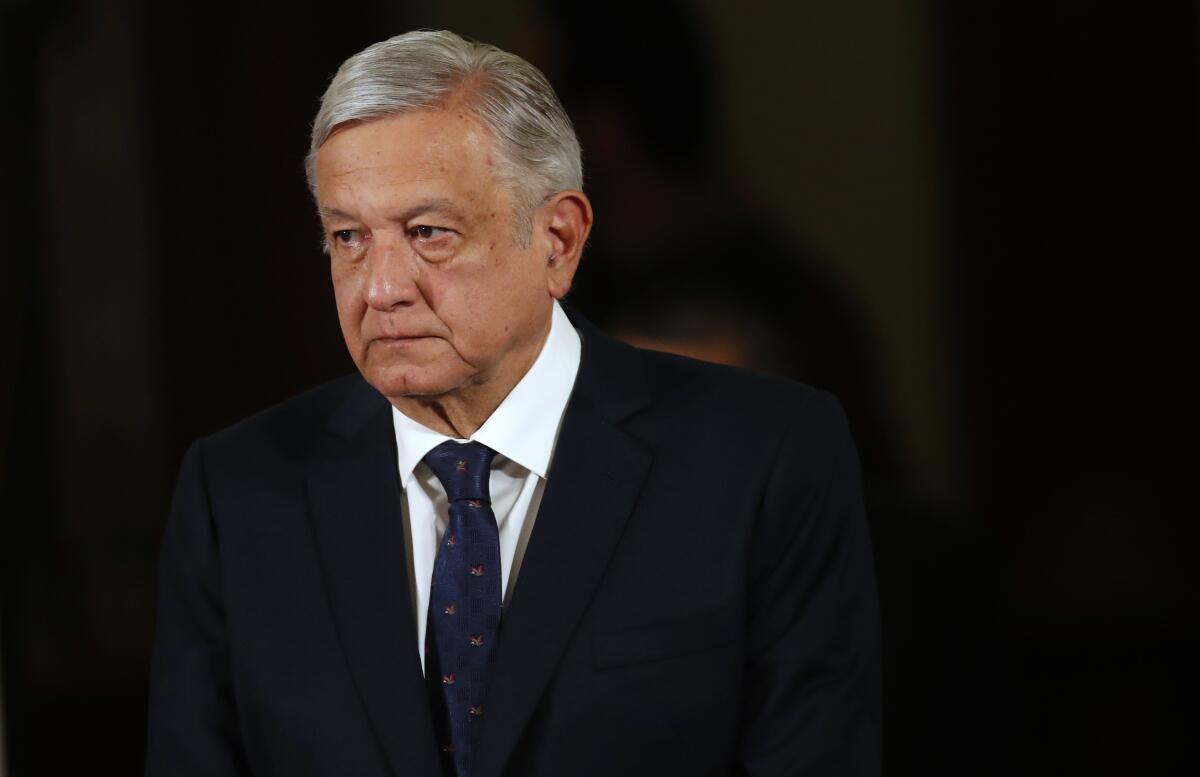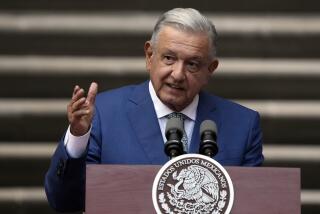Mexico’s president shifts tone on coronavirus, urges people to stay home, warns of dire consequences

MEXICO CITY — As the coronavirus pandemic spreads, Mexican President Andrés Manuel López Obrador has been criticized for what many called a lackadaisical posture — urging people to hug, shaking hands and kissing well-wishers as he stumped and extolling his personal talismans: Catholic scapulars, a shamrock and $2 bill.
“Because of our culture, Mexicans are very resistant to calamities,” the president said in a video recorded a week ago in a Oaxaca city eatery and circulated on social media.
“Continue bringing the family to eat in restaurants,” López Obrador advised compatriots, arguing that such activity bolsters “the popular economy.”
But as virus cases have begun surging, the president and his team have shifted their message radically in recent days, urging people to stay home and to practice physical distancing — and warning of dire results if that advice is ignored.
Although still avoiding curfews and mandatory stay-at-home orders, Mexican authorities are now abruptly citing a final chance to avert a national catastrophe that would inundate the country’s limited healthcare infrastructure and probably result in many deaths.
“Don’t go out into the street unless it is for something absolutely necessary,” López Obrador told the nation in a sober YouTube address Friday evening from the northern border city of Tijuana. “We have to be in our homes. We have to maintain a safe distance.”
The consequences of flouting the stay-at-home directive, he added, could be calamitous.
“The number of infection cases will spike upwards and will overwhelm our hospitals,” López Obrador declared, painting a grim scenario in stark contrast to his previously upbeat assessments. “We won’t have enough hospitals, beds, even if we are prepared to receive thousands.”
An even more dire appraisal came late Saturday from Hugo López-Gatell, undersecretary of health and the president’s coronavirus point man.
“This is the last chance we have. We can’t lose it,” López-Gatell said in a somber-toned news briefing. “We are saying to everyone: ‘Stay at home.’ ... It’s the only way to reduce this virus.”
As of Sunday, Mexico had reported 993 cases and 20 deaths, a low number compared with the neighboring United States, which reported more than 140,000 cases and more than 2,600 deaths as of Sunday.
But the first confirmed coronavirus infection was not reported in Mexico until late February, more than a month after the first case appeared in the United States. In recent days, however, Mexico has begun seeing rapidly accelerating numbers, pointing to the kind of steep surge seen in nations where coronavirus struck earlier.
With cases rising “exponentially,” López-Gatell warned, the sweep of the virus would soon be beyond containment.
Mexico has endeavored to enact a balancing act between preserving the public health while limiting damage to the nation’s sputtering economy. But López Obrador conceded Friday that the economic effects of an unrestrained pandemic could be much worse than the financial fallout from people staying at home.
Despite the latest ominous warnings, Mexican officials have still refrained from imposing mandatory stay-at home orders and the border closures seen in other nations, hoping to avoid massive economic and social displacement. Nonessential government workers, however, have been told to stay home, and the Holy Week break has been extended for schools. Officials have also urged private businesses to let people work remotely.
Some local governments have gone further. Mexico City has closed bars, theaters, churches, museums and other venues, while banning gatherings of more than 50 people. But restaurants and shops remain open in the capital, and street life continues at a much-reduced but still substantial pace.
For weeks, the Mexican president and other authorities have been reassuring the public that Mexico possesses adequate medical infrastructure — including hospital beds, medicines and equipment — to deal with the pandemic. But doctors and nurses have taken to the streets in recent days across the country protesting what they call a lack of masks, gowns, gloves and other essentials as
Sánchez is a special correspondent.
More to Read
Sign up for Essential California
The most important California stories and recommendations in your inbox every morning.
You may occasionally receive promotional content from the Los Angeles Times.









